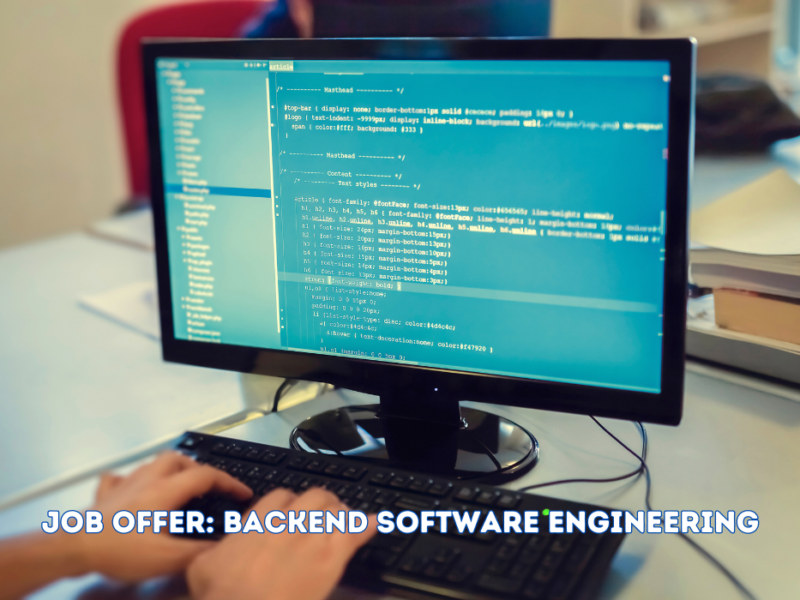Introduction to Backend Software Engineering
Are you passionate about developing cutting-edge technology solutions? Do you thrive in a dynamic environment where innovation and collaboration are valued? If so, you might be the perfect fit for the role of Backend Software Engineer. In this article, we’ll delve into the exciting world of backend software engineering, focusing on the specific position of a Software Engineer with 5-6 years of experience in the IT/Technology sector.
Understanding the Position
What Does a Backend Software Engineer Do?
As a Backend Software Engineer, your primary responsibility is to design, develop, and maintain backend services, databases, and cloud integrations. You’ll work closely with frontend developers and product teams to ensure seamless communication between the user interface and the server-side logic.
Key Technologies and Skills
To excel in this role, you’ll need a strong foundation in technologies such as Node.js, NestJS, MongoDB, PostgreSQL, TypeScript, and JavaScript. Additionally, experience with Azure development tools, web APIs, and code versioning tools like Git is highly desirable.
Responsibilities of a Backend Software Engineer
Designing Scalable Backend Services
One of the key responsibilities of a Backend Software Engineer is to design scalable and high-performance backend services using technologies like Node.js and NestJS. This involves architecting solutions that can handle large volumes of data and user requests efficiently.
Managing Databases and Data Integrity
Backend Software Engineers work with databases like MongoDB and PostgreSQL to ensure data integrity, performance, and scalability. They design database schemas, optimize queries, and implement strategies for data storage and retrieval.
Developing Web APIs
Web APIs serve as the bridge between frontend and backend systems, enabling communication and data exchange. Backend Software Engineers are tasked with developing and maintaining robust web APIs that adhere to industry standards and best practices.
Integrating Cloud Services
In today’s cloud-centric environment, integration with cloud services is essential for scalability and flexibility. Backend Software Engineers leverage platforms like Azure to integrate services such as service bus, functions, and Elasticsearch into the development process.
Ensuring Code Quality and Security
Maintaining high standards of code quality and security is paramount in backend development. Engineers conduct code reviews, implement testing strategies, and adhere to security best practices to mitigate risks and vulnerabilities.
Qualifications and Skills Required
Educational Background
A Bachelor’s degree in Computer Science, Information Technology, or a related field is typically required for a Backend Software Engineer role. Additionally, certifications or specialized training in relevant technologies can be advantageous.
Technical Proficiency
Candidates should possess strong proficiency in backend technologies such as Node.js, NestJS, MongoDB, and PostgreSQL. Familiarity with frontend languages and frameworks, as well as cloud platforms like Azure, is also beneficial.
Soft Skills
In addition to technical expertise, soft skills such as problem-solving, communication, and teamwork are essential for success in this role. Backend Software Engineers collaborate with cross-functional teams and stakeholders to deliver innovative solutions.
Conclusion
In conclusion, the role of a Backend Software Engineer is critical in driving innovation and efficiency in IT/Technology organizations. With the right combination of technical skills, experience, and passion for technology, you can embark on a rewarding career journey in backend software engineering.
FAQs (Frequently Asked Questions)
1. What qualifications are required to become a Backend Software Engineer?
To become a Backend Software Engineer, you typically need a Bachelor’s degree in Computer Science or a related field, along with experience in backend development technologies.
2. What programming languages are commonly used in backend development?
Backend development often involves languages such as Node.js, Python, Java, and Ruby, depending on the specific requirements of the project.
3. Is experience with cloud platforms necessary for a Backend Software Engineer?
While not always mandatory, experience with cloud platforms like Azure or AWS is highly beneficial for Backend Software Engineers, as cloud services play a crucial role in modern application development.
4. How can I enhance my skills as a Backend Software Engineer?
To enhance your skills as a Backend Software Engineer, consider pursuing advanced training courses, participating in hackathons or coding challenges, and staying updated with the latest trends and technologies in backend development.
5. What career opportunities are available for Backend Software Engineers?
Backend Software Engineers have a wide range of career opportunities in industries such as e-commerce, finance, healthcare, and technology startups. Roles may vary from backend developer to technical lead or architect, depending on experience and expertise.


Comments